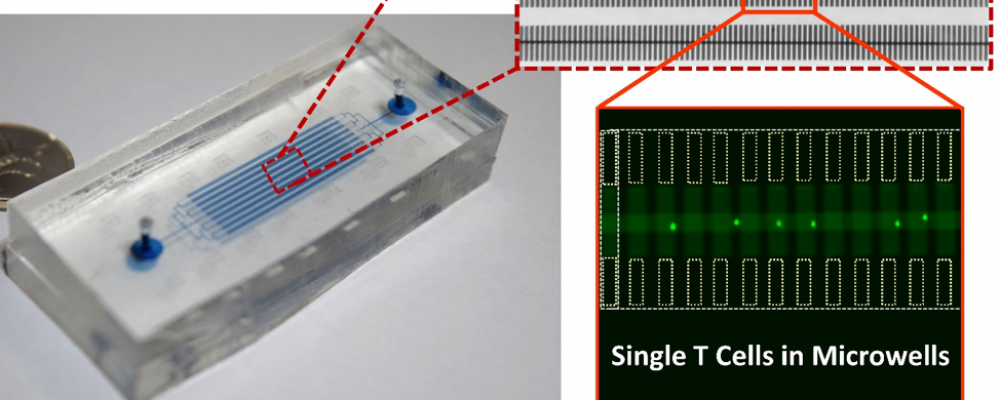A team of Engineering researchers from NYU Abu Dhabi (NYUAD) have developed a new microchip that efficiently isolates immune T cells, which would enable researchers to precisely identify the type and amount of released cytokines from each individual cell for immuno-characterization of single T cells. Accurate and real-time measurement of T cells’ responses to various bacteria and viruses is critical to understanding the immune status of patients and evaluating how treatment is efficient as well as the efficacy of new candidate drugs.
In the study, “Airplug‐Mediated Isolation and Centralization of Single T Cells in Rectangular Microwells for Biosensing,” published in the journal Advanced Therapeutics, Assistant Professor of Mechanical and Biomedical Engineering Mohammad Qasaimeh and colleagues explain how they developed a microchip that isolates immune T cells from blood samples, in a massive array of rectangular microwells, with a systematic high efficiency of centralized single cell per microwell.
They achieved this by engineering in situ generated air bubbles and microfabricated matrix of microwells coated with specific antibodies. The developed system provided precise cytokine detection at the individual cell level. The new chip improved the real-time analysis of the cytokine profiles of single T cells, and could be applied to other immune cells such as B and natural killer cells. T cells’ functional signatures identify the “immune phenotype” of patients, which is an important step toward developing personalized medicine approaches.
“The human body’s defense system is highly complex, and the ability to most effectively treat patients has been limited by a lack of understanding about how specific cytokines combat viruses and bacteria,” said corresponding author Qasaimeh. “Immune cells are incredibly heterogeneous because they are disease and patient-specific.”
The first author of the study, Research Assistant with NYUAD’s Engineering Division Pavithra Sukumar, commented: “Our findings enable, for the first time, precise unbiased evaluation of the immune response of T cells, isolated within rectangular microwells, for quantitative, real-time analysis of the released cytokines.”
Second author in the study, Research Scientist with NYUAD’s Engineering Divisions Muhammedin Deliorman, mentioned: “This isolation of immune cells can help elucidate precisely the immune response of cells at single cell level, especially for phenotyping and biotherapeutics studies.”




